Doctor Appointment App Development: 2025 Handbook for Care Facilities

You provide high-quality patient care in your health facility. You focus on advanced treatment methods, organizing staff training, and implementing expensive state-of-the-art medical equipment.
However, administrative and technical failures can negate your and your team’s efforts. According to survey results published by Business Wire, 61% of surveyed patients could not go to the doctor because it was too difficult to make an appointment.
Doctor appointment app development can give you a convenient digital tool for easy patient access to your medical care. In this handbook, you will learn about the peculiarities of developing a doctor appointment app.
Overview of Doctor Appointment Apps
Whether you’re a patient, healthcare provider, or a healthtech startup, building a custom appointment app can benefit your case these ways:
1. Patients are at the heart of healthcare, and doctor appointment apps should offer numerous advantages to enhance their experience. 67% of patients prefer online booking for their medical appointments. This preference is particularly strong among younger generations, with more than half of Millennials and Gen Xers stating they would switch providers for the ability to book appointments online.
One of the most significant benefits is the convenience of 24/7 appointment scheduling. Patients should be able to book appointments at any time, eliminating the constraints of office hours and providing unprecedented flexibility. 40% of appointments are booked after business hours, emphasizing the need for round-the-clock booking capabilities.
2. Healthcare providers gain significant benefits with doctor appointment apps, streamlining their operations and enhancing patient care. 68% of patients say they’re more likely to choose a medical provider that offers the ability to book, change, or cancel appointments online.
One of the primary advantages is improved efficiency. These apps automate scheduling tasks, reducing the need for manual input and management, which can often be time-consuming and prone to errors.
The use of mobile devices and apps has been shown to have a positive effect on patient care outcomes. A staggering 82% of clients use mobile devices to book appointments, compared to only 16% on desktops and 2% on tablets.
3. For startups venturing into doctor appointment app development, the market presents significant opportunities.
The global market size for doctor appointment apps reached a valuation of USD 5.2 Billion in 2023. This market is projected to achieve a remarkable expansion, with estimates suggesting it will reach USD 11.5 Billion by 2030, growing at a compound annual growth rate (CAGR) of 11.50% from 2024 to 2030.
Key factors fueling this growth include the rising prevalence of chronic diseases, which necessitate frequent medical consultations, and the growing preference for remote healthcare services. The COVID-19 pandemic has accelerated the digital transformation in healthcare, leading to a surge in the adoption of these apps.
We can note that the doctor appointment app market is segmented as follows:
- Primary care appointments
- Specialty care appointments (e.g., cardiology, oncology, orthopedics)
- Telemedicine services
- Appointment reminders
- Healthcare provider scheduling solutions, etc.
By creating innovative solutions that streamline the appointment booking process, enhance communication, and improve overall healthcare delivery, healthcare providers and startups can position themselves for success in this rapidly growing market.
12 Must-Have Features of Doctor Appointment Booking Apps
User Registration and Profile Management
A seamless user registration and profile management feature is crucial when you develop a doctor appointment app. This functionality allows patients to easily sign up, log in, and manage their profiles, including personal information, medical history, and preferences.
The sign-up process should be intuitive and straightforward, guiding users to input essential details like name, contact information, and medical history. This data will help create a personalized healthcare experience. User profiles should be easily editable, allowing patients to update their information as needed.
Search and Filter Functionality
Search and filter functionality are essential for helping users find the right doctor quickly. This feature allows users to search for doctors based on various criteria, such as specialty, location, language, and availability.
When developing a doctor appointment app, it’s important to implement advanced search filters that make it easy for users to narrow down their options. Users should be able to compare multiple doctors side-by-side and select the most suitable one for their needs.
Prioritizing intuitive search functionality in doctor appointment app development can significantly enhance the user experience and ensure that patients can easily access the care they need.
Doctor Profiles and Reviews
Doctor profiles and reviews are essential for building trust and helping users make informed decisions. This feature allows users to view detailed profiles of doctors, including their specialties, qualifications, and patient reviews. Doctors should be able to update their profiles easily to keep information current.
Implementing a review system encourages feedback and accountability, which can enhance the credibility of the app and improve user satisfaction. Patient reviews and ratings can build trust and transparency, allowing users to evaluate the quality of care they can expect. This feature not only helps other users make informed decisions but also motivates healthcare providers to maintain high standards of care.
Appointment Booking and Scheduling
The core of doctor appointment app development is the appointment booking and scheduling. This feature enables users to search for available time slots, book appointments, and manage their schedules.
When developing a doctor appointment app, it’s important to implement a user-friendly calendar interface that clearly displays available time slots and allows for easy booking. Additionally, the app should support rescheduling and canceling appointments.
Integration with healthcare providers’ calendars ensures accuracy and prevents double bookings, which is a common challenge in the practice of doctor appointments.
Secure Doctor-Patient Communication
Secure doctor-patient communication, including messaging, is vital for maintaining patient privacy. This feature allows patients to send messages and share documents with their doctors, including asking follow-up questions, sharing test results, and discussing treatment plans, enhancing the continuity of care.
When developing a doctor appointment app, it’s crucial to implement end-to-end encryption and comply with data protection regulations such as HIPAA and GDPR.
Video Conferencing & Audio Calls
Telemedicine capabilities through video conferencing and audio calls enrich doctor appointment app functionality. In this way, doctor-patient communication becomes continuous and smooth.
This feature allows you to cover consultations, informing about the patient’s condition and possible health complaints, and other important elements of the interaction of medical professionals with patients.
The telemedicine functionality is particularly valuable for follow-up appointments, minor health concerns, or patients with mobility issues.
Appointment Notifications and Reminders
Notifications and reminders are crucial for keeping patients informed and reducing missed appointments. Automated reminders can reduce no-shows by 29%. This is significant considering that missed medical appointments are estimated to cost the healthcare industry $150 billion per year.
This common feature in doctor appointment apps can include appointment confirmations, reminders, and follow-up notifications.
When developing a doctor appointment app, it’s important to implement a robust notification system that supports push notifications, SMS, and email alerts. Additionally, the app should allow users to customize their notification preferences.
Appointment History and Analytics
Tracking appointment history and analytics allows patients to view past consultations, treatments, and prescriptions, which is invaluable for ongoing care. This data can help users track their healthcare journey and share information with other providers if needed. Doctors can also use this data to analyze patient trends and optimize their practice.
Pharmacy and e-Prescribing (eRx) Management
A robust prescription management system can greatly improve medication adherence. You can implement features such as medication reminders, refill alerts, and the ability to order prescription refills directly through the app. This functionality helps patients stay on top of their treatment plans and reduces the risk of missed doses.
Several options are available when implementing a prescription system. In particular, you can give the patient the following opportunities:
- Manage prescriptions
- View the prescription list
- Form a page with detailed information on prescriptions with a QR code
You can additionally enhance the management of prescriptions for medicinal products by applying integrations. E-prescribing integration allows healthcare providers to send prescriptions electronically to pharmacies. This feature enhances medication safety, reduces errors, and improves efficiency in the prescription process.
Checkouts with multiple payment options
A checkout system with multiple payment options ensures a smooth and convenient patient experience. The app can cater to the patient’s financial preferences if supporting various payment methods such as wallet, credit/debit cards, Apple/Google Pay, and bank transfers. Providing your app with these diverse payment options leads to higher appointment booking rates and patient retention.
Billing
The billing feature in a doctor appointment app is crucial for streamlining the payment process and maintaining transparency between patients and healthcare providers.
This function allows automated invoice generation after appointments, detailing the services rendered and the associated costs. Patients can easily view and pay their bills through the app, using various payment methods.
For healthcare facilities, the billing feature simplifies the billing process, reducing administrative workload and minimizing errors. Additionally, it provides patients with a clear, itemized breakdown of charges, which enhances trust and ensures that they understand exactly what they are paying for.
User Support
Providing excellent user support is key to ensuring high user satisfaction and retention. This can include FAQs, chat support, and a helpdesk. Leading apps provide a robust support section, offering immediate assistance and troubleshooting guides.
Launching a doctor appointment app with basic features. A real-world example
The quality-implemented core features of your doctor booking app make it a viable product that attracts customers even before advanced functionality is added.
See how the Riseapps client gained from the doctor appointment app development immediately after the MVP stage.

Almond, a women’s health company, collaborated with Riseapps to develop a web platform featuring doctor appointment functionality.
The purpose of the work was to deliver a set of workflows to book patients into our clinic in Los Angeles. The deliverables were to ensure an appointment could be booked, that patients could sign up, that patients could sign in, and that patients could be diverted to specific intake questions based on their answers to previous questions. We also wanted admins to be able to book on behalf of patients
Tara Raffi, Founder
Riseapps developers built and launched a robust MVP in just 4 months, facilitating the appointment booking flow. With the MVP, Almond booked 462 patients in its first month and raised over $7m in funding.
They were highly responsive to our needs as a team and extremely knowledgable about programming and the needs of our patients. The completed project has allowed us to accrue revenue and test our hypothesis that patients have unmet needs in the ObGyn category.
Tara Raffi, Founder
Optional Enhancing Features for Doctor Appointment Booking App Development
A successful doctor appointment app can go beyond basic scheduling functionality. To create a truly comprehensive and user-friendly solution, we recommend incorporating the following optional features that can significantly enhance the user experience and set your app apart in the competitive healthcare market.
Health Tracking and Monitoring
Integrating health tracking capabilities allows patients to monitor their vital signs, symptoms, and overall well-being. This feature can include tools for tracking blood pressure, heart rate, and other health metrics. By enabling patients to record and share this data with their healthcare providers, you facilitate more informed and personalized care.
Multi-language Support
To cater to a diverse patient population, we recommend incorporating multi-language support. This feature ensures that the app is accessible to users who speak different languages, broadening its reach and usability.
Family Profiles
Allowing users to create and manage family profiles within the app can be particularly beneficial for caregivers. This feature enables users to schedule appointments and manage health information for dependents or elderly family members, streamlining the care process for entire families.
AI Chatbot and AI Assistant
Implementing an AI-powered chatbot can provide 24/7 support to users, answering common health queries, assisting with appointment scheduling, and even performing initial symptom assessments. This feature can significantly reduce the workload on healthcare staff while improving patient engagement.
Wellness Programs and Resources
Incorporating wellness programs and educational resources can transform your app into a comprehensive health solution. This may include features such as fitness tracking, nutritional guidance, and mental health resources, promoting overall well-being among users.
In-app Lab Test Booking
Integrating lab test booking functionality allows users to schedule and manage their diagnostic tests seamlessly. This feature can include options to view test results directly within the app, enhancing convenience for both patients and healthcare providers.
Offline Access
Enabling offline access to certain app features ensures that users can still access important health information and appointment details even without an internet connection. This is particularly useful for patients in areas with limited connectivity.
Waiting List Management
A waiting list management feature can help optimize appointment scheduling by automatically notifying patients of available slots due to cancellations. This improves efficiency and reduces wait times for patients seeking urgent care.
Gamification & Rewards
Introducing gamification elements and reward systems can encourage user engagement and promote healthy behaviors. This might include achievements for regular check-ups or adherence to treatment plans.
Emergency & Alarms
Incorporating emergency features such as quick access to emergency services or medication alerts can provide an additional layer of safety for users with chronic conditions or those prone to health emergencies.
Transmitting Images
Enabling users to securely transmit images to healthcare providers can be invaluable for dermatological issues, wound care, or other visually diagnosable conditions. This feature enhances the app’s diagnostic capabilities and improves the accuracy of remote consultations.
By incorporating these optional enhancing features, we at Riseapps can help you develop a comprehensive doctor appointment app that not only meets but exceeds user expectations.
Top Integrations That Make Doctor Appointment App Development Costs 40% More Affordable
Integrating key features into your doctor appointment app can significantly enhance its functionality while keeping development costs in check. Let’s explore some essential integrations that can make your app more efficient and cost-effective.
Electronic Health Records (EHR)/ Electronic Medical Records (EMR) Systems Integration
Integrating EHR/EMR systems into your doctor appointment app can streamline data exchange between the app and healthcare providers’ record-keeping systems . This integration facilitates seamless access to patient information, improving the efficiency of care delivery and reducing the need for manual data entry.
Health Information Exchange (HIE) Integration
HIE integration enables secure sharing of patient data across different healthcare organizations. This feature enhances care coordination and reduces duplicate testing, ultimately leading to cost savings for both providers and patients.
Patient Portal Integration
A patient portal integration allows users to access their health information, view test results, and communicate with healthcare providers. This feature empowers patients to take an active role in their healthcare, potentially reducing the need for unnecessary appointments.
Payment Gateway Integration
Incorporating a secure payment gateway into your app streamlines the billing process, making it easier for patients to pay for services and reducing administrative costs for healthcare providers.
Telemedicine Platform Integration
Telemedicine integration enables remote consultations, which can be particularly useful for follow-up appointments or non-urgent medical issues. This feature can significantly reduce operational costs and improve access to care.
Insurance Provider and Billing Systems Integration
Integrating insurance and billing systems can automate claim processing and verification, reducing administrative workload and potential errors.
Calendar and Scheduling Integration
A robust scheduling system integration helps optimize appointment management, reducing no-shows and improving overall efficiency.
Wearable Device Integration
Integrating wearable device data can provide healthcare providers with valuable insights into patients’ health metrics, potentially reducing the need for in-person monitoring.
Customer Relationship Management (CRM) Integration
CRM integration can help manage patient relationships more effectively, improving patient retention and satisfaction . It creates a 360-degree view of patients by organizing and analyzing data from various touch points across your business.
Laboratory Information System (LIS) Integration
LIS integration streamlines the process of ordering lab tests and receiving results, improving diagnostic efficiency and reducing turnaround times.
AI Chatbot and AI Assistant Integration
AI-powered chatbots can handle routine inquiries, schedule appointments, and provide basic health information, reducing the workload on human staff.
Analytics and Reporting Tools Integration
Integrating analytics tools can provide valuable insights into app usage, patient behavior, and operational efficiency, helping to identify areas for improvement and cost reduction.
Push Notification Services Integration
Push notifications can remind patients of upcoming appointments, medication schedules, and health tips, potentially improving adherence and reducing no-shows.
Mapping and Navigation Services Integration
Integrating mapping services can help patients locate healthcare facilities easily, potentially reducing late arrivals and improving overall appointment efficiency.
By strategically implementing these integrations, you can develop a comprehensive doctor appointment app that not only enhances user experience but also optimizes operational efficiency, potentially reducing overall development and maintenance costs by up to 40%.
Client Success Stories from a Doctor Appointment App Development Company
KEGO online urgent care clinic
Riseapps helped the client create a virtual urgent care clinic. This build-from-scratch solution required extensive doctor appointment booking functionality.

The main project challenges were ensuring cross-platform operation and patient data protection compliance with standards. The following solutions contributed to the software product’s success.
Cross-platform and patient-friendly
The Riseapps team developed iOS and Android apps, and web apps for connecting physicians and patients.
Facilitated appointment booking and scheduling
To book an appointment, patients need to make a few taps on the screens of their devices. It is enough for them to choose a doctor, date, and time, and specify the issue.
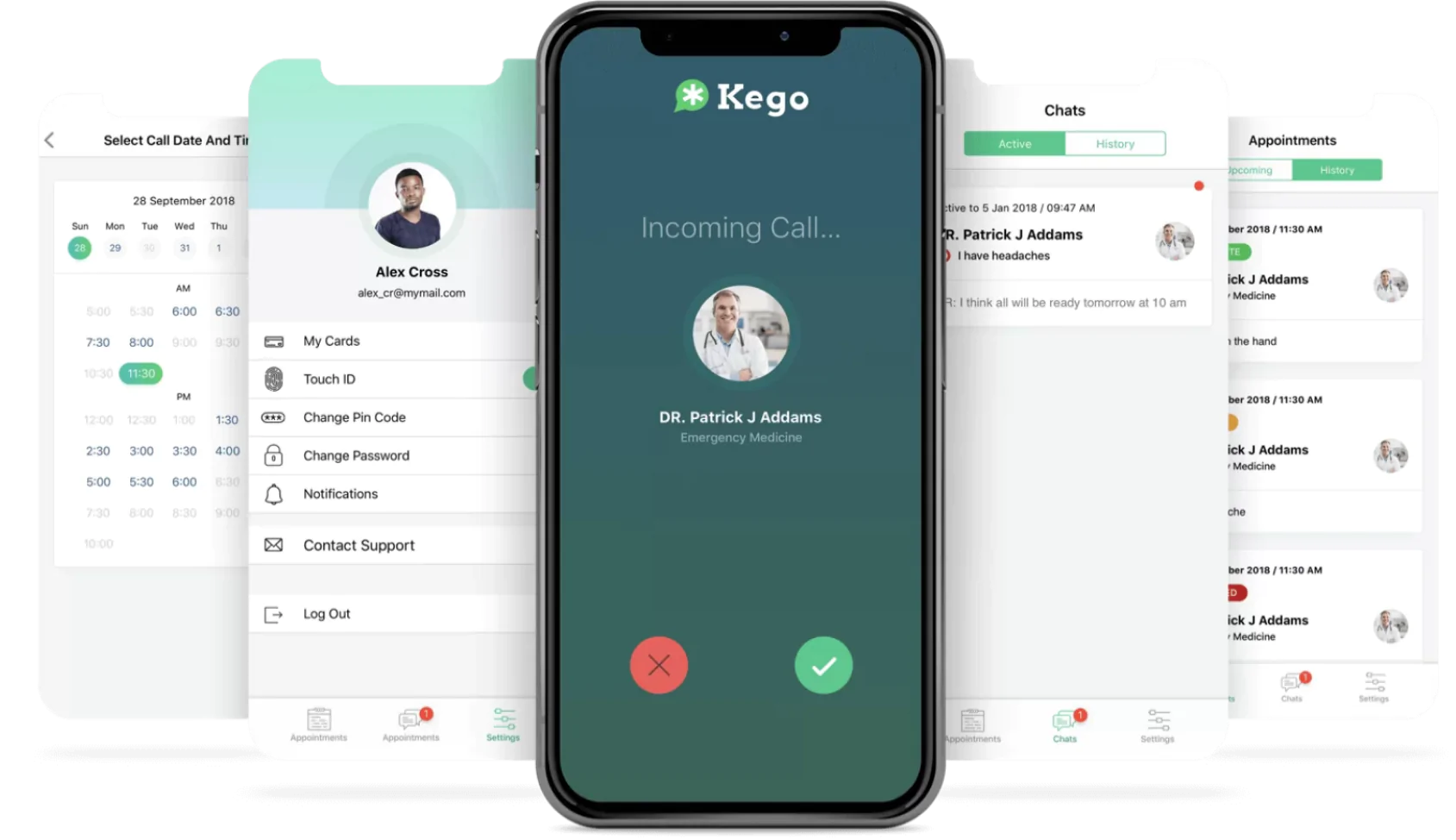
Appointment History and Analytics
Patients can access their appointment history and medical charts at any time easily tracking their data via apps.
Doctor-patient communication
The platform provides advanced physician-patient communication capabilities. Patients can communicate with doctors via video conferencing, as well as text, voice, and video messages.
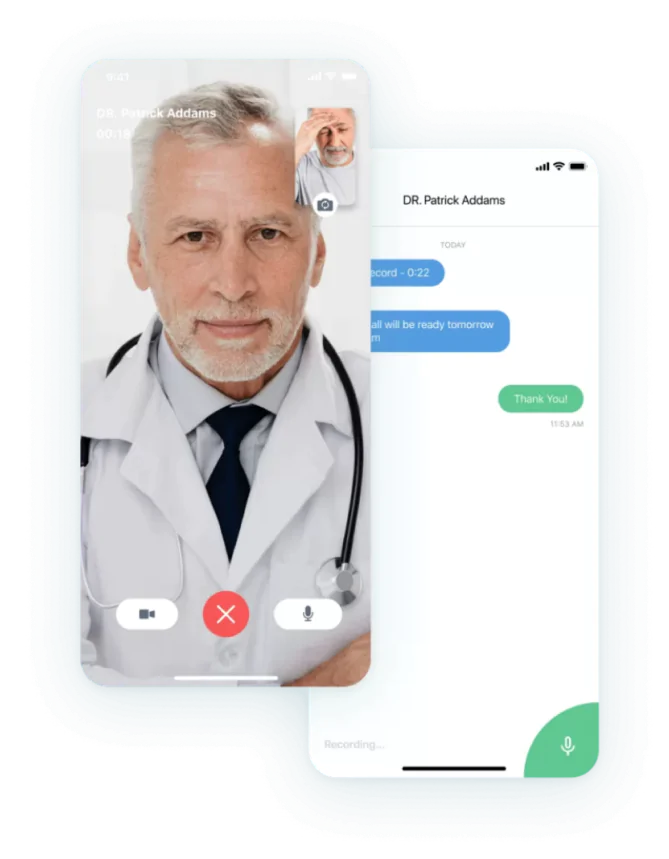
HIPAA Compliance
As HIPAA-compliant software, Kego ensures the protection of all patient health information.
Billing and payments
The platform has billing and payment functionality, allowing patients to pay seamlessly through integrated payment gateways and access payment information constantly.
Riseapps greatly executed all my ideas, and they also offered their own. Kego turned out to be even better than I imagined.
Maher R., Kego founder
Black Doctor 24/7 HIPAA-compliant telemedicine platform
Dr. Bill J. Releford, founder of The Releford Foot & Ankle Institute, defined the mission of Black Doctor 24/7 in overcoming health care disparities and implementing innovative treatment approaches.

Black Doctor 24/7 is an example of a comprehensive platform streamlining the patient-doctor interaction. Project stakeholders decided to strengthen the core functionality of the doctor appointment booking app with advanced features and integrations.
Appointment Booking and Scheduling
Riseapps developers have made a feature called appointment booking intuitive and engaging. To the ease of 24/7 scheduling appointments with a physician, they have also added the possibility of pre-appointment consultations.
Doctor Profiles and Reviews
The Black Doctor app gives patients 24/7 access to a selection of physicians depending on their specialty, experience, and reviews.
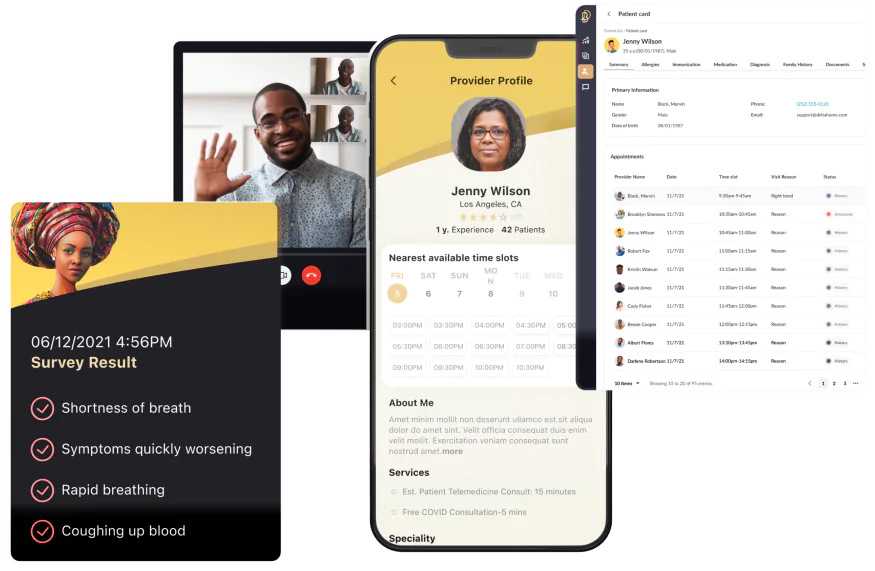
AI assistant
One of the highlights of this doctor appointment development project was creating the Amina AI assistant. This virtual assistant supports clinic-patient communication, pre-screening, and automated self-assessment features. That’s why physicians have more information about the condition of patients before consultations.
With AI-powered Amina available 24/7, the clinic team successfully automated the patient care delivery process and reduced the patient service time.

3rd-party services integration for seamless communication
Implementation of the Black Doctor 24/7 concept required advanced telemedicine functionality. Riseapps developers integrated the Agora video streaming platform and GetStream (now Stream) PaaS, providing doctor-patient real-time video communication.
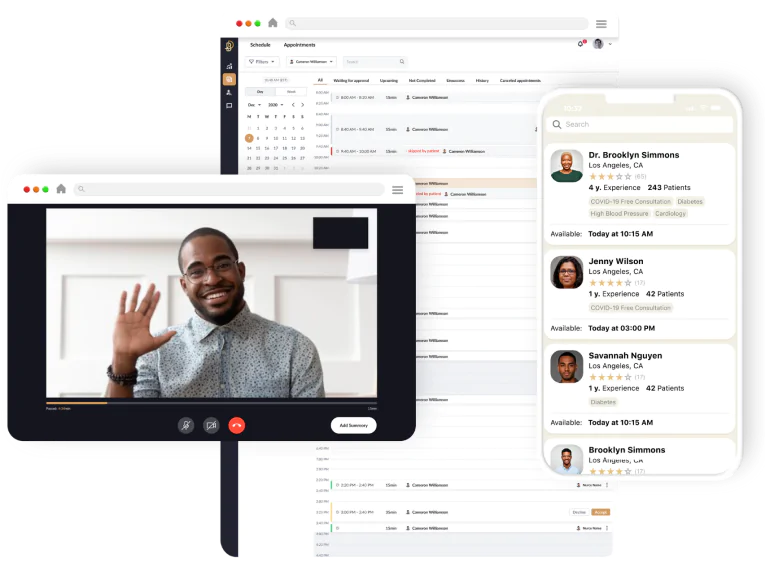
Black Doctor 24/7 team with a cross-platform app, which took only six months to build, reduced care delivery overheads by 40% and won the loyalty of many patients, reaching the planned goal of $100M in revenue.
Most Common Flaws of Doctor Appointment Apps and How to Prevent Them
Technical shortcomings and ignorance of the intricacies of doctor appointment booking app development can bring to naught all the efforts of project stakeholders. Users whose expectations were not met by your app can switch to a competitor’s software product without waiting for your team to fix bugs.
According to research published by Business Wire, healthcare providers’ digital solutions do not meet the expectations of 63% of their patients. In 2022, 70% of individuals surveyed said they had tried to book a medical appointment online in the past year through a patient portal, website, or an app, but were redirected to finish scheduling by phone call.
By giving users the floor and based on their real-world feedback, we will consider what pitfalls are on the path of doctor appointment app development projects. We will also accompany claims about typical app flaws with our comments about how to prevent them.
Data Security Concerns

How to prevent these shortcomings:
- Implement robust encryption methods and comply with HIPAA and other relevant data protection regulations
- Regularly update security protocols and conduct audits to ensure data security
Poor User Interface



How to prevent these shortcomings:
- Conduct thorough user testing and gather feedback during the development phase.
- Implement a clean and intuitive user interface with clear navigation paths.
- Provide onboarding tutorials and tooltips to guide users.
App Crashes and Bugs


How to prevent these shortcomings:
- Conduct rigorous testing, including unit testing, integration testing, and user acceptance testing (UAT)
- Implement a robust bug tracking and reporting system.
- Regularly update the app to fix bugs and improve performance
Inaccurate Scheduling and Confusion

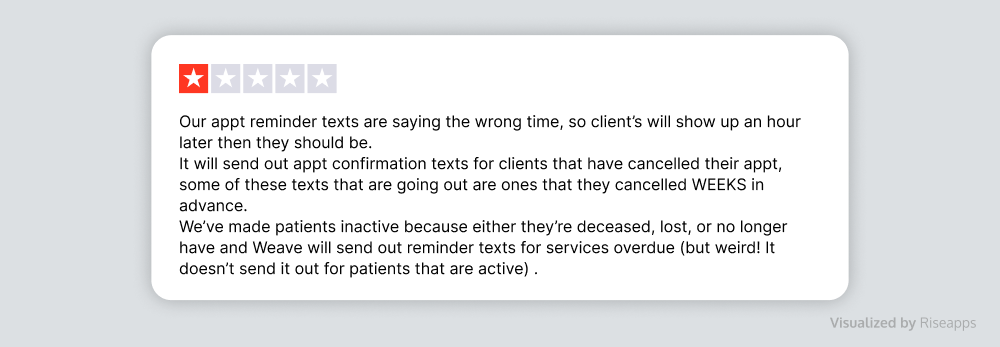
How to prevent these shortcomings:
- Ensure real-time synchronization with the doctor’s actual schedule to prevent double bookings and inaccuracies
- Implement an automated confirmation system to verify appointments and notify patients of any changes immediately
Poor Communication Features
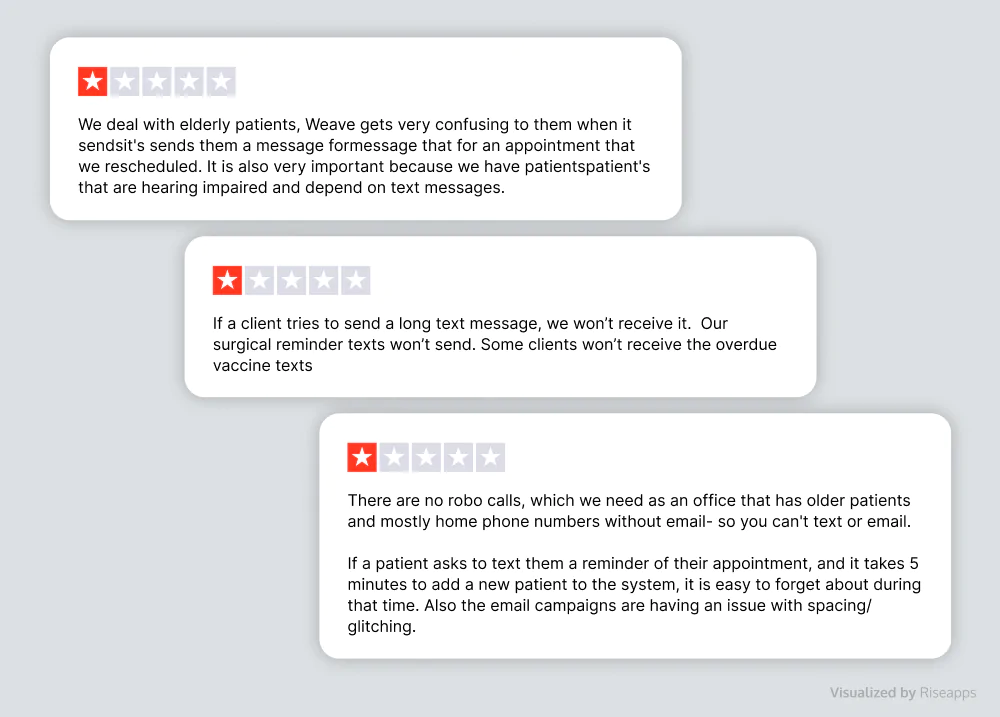
How to prevent these shortcomings:
- Implement real-time messaging with push notifications
- Ensure high-quality video and audio call functionality
- Provide options for secure file sharing and image transmission
How Much Do the Doctor Appointment App Development Company Services Cost?
The investment required for a doctor appointment app development project can vary based on several factors.
Here is what, in particular, affects the doctor appointment app development cost.
Functionalities
The complexity and number of features in your app directly impact the cost. More complex features often require longer development times or a larger team of developers. The set and complexity of integrations for your doctor appointment app also influence the project budget.
Platforms
Whether you’re developing for Android, iOS, or both platforms will impact the overall cost.
Location of doctor appointment app development company
Developer rates vary by location, which can significantly influence the final cost.
Thus, a doctor appointment app company can determine the exact development cost when it studies the requirements for the software product.
As for approximate cost and time parameters, when you contact us at Riseapps, you can expect the following:
- Doctor appointment PoC development: from $15k and 14 days.
- Doctor appointment MVP development: from $45k and 60 days.
- Full-fledged doctor appointment app development: from $100k and 4 months.
Have a custom product vision or doctor appointment flow that you need to automate? Fill out the form and get a quote for a fixed price today.
How to Develop a Doctor Appointment App: Main Stages
At Riseapps, we follow a comprehensive approach to doctor appointment app development, ensuring a robust and user-centric solution. Our process involves six key stages, each critical to the success of your healthcare application.
Discovery
We initiate your project with a thorough discovery phase. This stage involves detailed collaboration to outline technical requirements, develop a product prototype, create a business process diagram, estimate budgets, and formulate a project plan. Our meticulous preparation minimizes risks and sets a solid foundation for effective and efficient app development.
Riseapps provides a comprehensive Project Discovery service package tailored for medical facilities aiming to explore and conceptualize a doctor appointment app. This service includes a detailed analysis of the app idea and its operational framework.

Additionally, the Project Discovery & Design package encompasses app design, offering a UI audit for existing interfaces with actionable recommendations. Clients can also benefit from custom-designed web and mobile UI interfaces, UX architecture, and detailed UX flows.

Proof of Concept
We take a gradual approach to your doctor appointment app project, starting with a Proof of Concept (PoC). This phase allows us to validate the feasibility and potential of your healthcare product concept in a real-world setting. Our expertise in user research and prototype testing enables us to gather critical feedback from early users and present your concept to investors.

MVP Development
Upon successful PoC validation, you can move to developing a Minimum Viable Product (MVP).
At this stage, it is advisable to focus on essential features that address the core needs of users. This approach allows you to test the market response and gradually add more advanced features based on user feedback.
Riseapps’ experience in doctor appointment app MVP development helps build a functional app that delivers immediate value and sets the stage for further enhancements.
We help you avoid common pitfalls such as:
- Failing to balance features, which can limit usefulness or overwhelm users
- Neglecting scalability, hindering the MVP’s ability to handle growth
- Overlooking performance metrics, limiting understanding of the app’s success.

Full-Scale App Development
After validating the MVP, we advance to full-scale development to refine and expand your doctor appointment app. This phase focuses on adding new features, improving performance, and ensuring scalability to meet increasing user demands.
Our proven track record in delivering healthcare apps ensures that your application is enhanced with robust functionalities and seamless integration with existing systems.
We address major challenges at this stage, including:
- Adapting to market changes to maintain relevance
- Implementing consistent updates to resolve bugs and maintain user engagement
- Optimizing performance to prevent slow load times and crashes
- Implementing robust security measures to protect user data
Rigorous Testing and Quality Assurance
To ensure the quality and stability of your doctor appointment app, we implement automated testing for continuous integration and deployment. Our comprehensive testing covers functionality, performance, security, and user experience to ensure the app operates smoothly and securely .
We focus on critical aspects such as:
- Data privacy
- User interactions
- Accessibility features
Our testing strategy includes:
- Vulnerability assessments to identify security weaknesses
- Penetration testing to evaluate the effectiveness of security measures
- Code reviews to analyze the application’s source code for security flaws
- Compliance auditing to ensure ongoing adherence to data protection laws
Post-Launch and Maintenance
To ensure the ongoing success of your doctor appointment app, we implement a thorough maintenance strategy. We regularly refine the app to address user needs and adapt to the evolving healthcare landscape. Our robust user support promptly resolves technical issues and maintains a positive user experience.
Key aspects of our post-launch strategy include:
- Actively seeking and addressing user feedback
- Consistent maintenance to ensure app stability
- Regular security updates to protect user data and app integrity
By following this comprehensive development process, we at Riseapps ensure that your doctor appointment app is not only feature-rich and user-friendly but also secure, scalable, and compliant with healthcare regulations.
Contact Us






